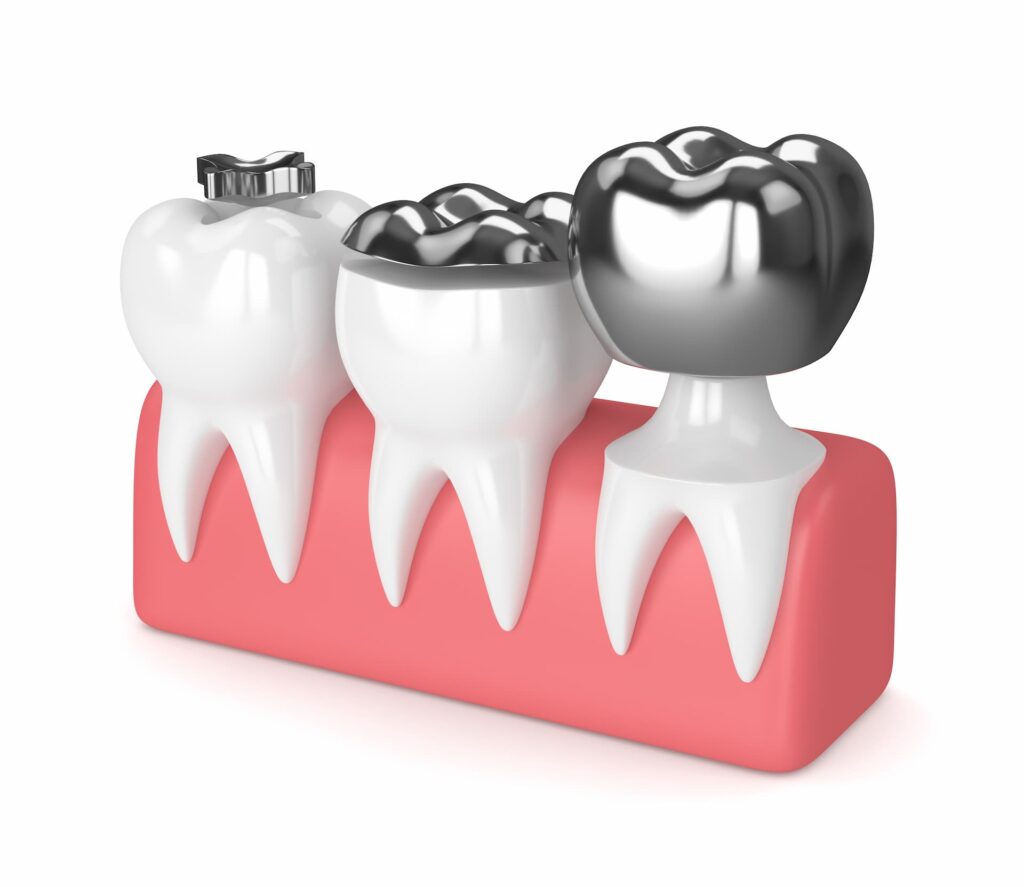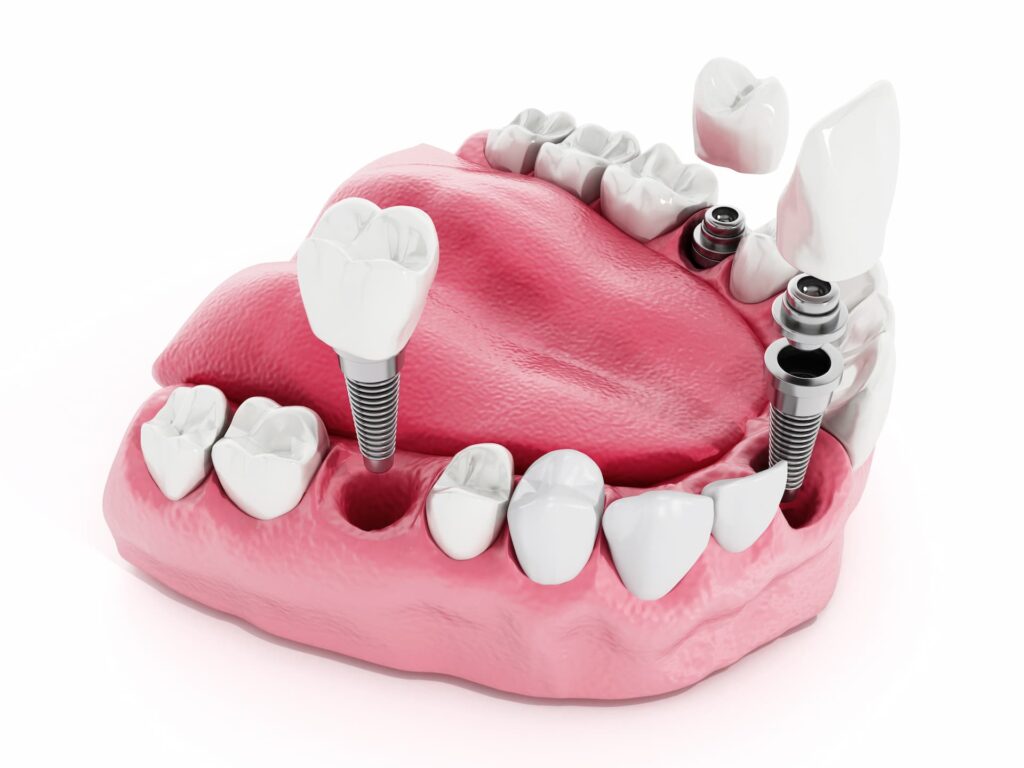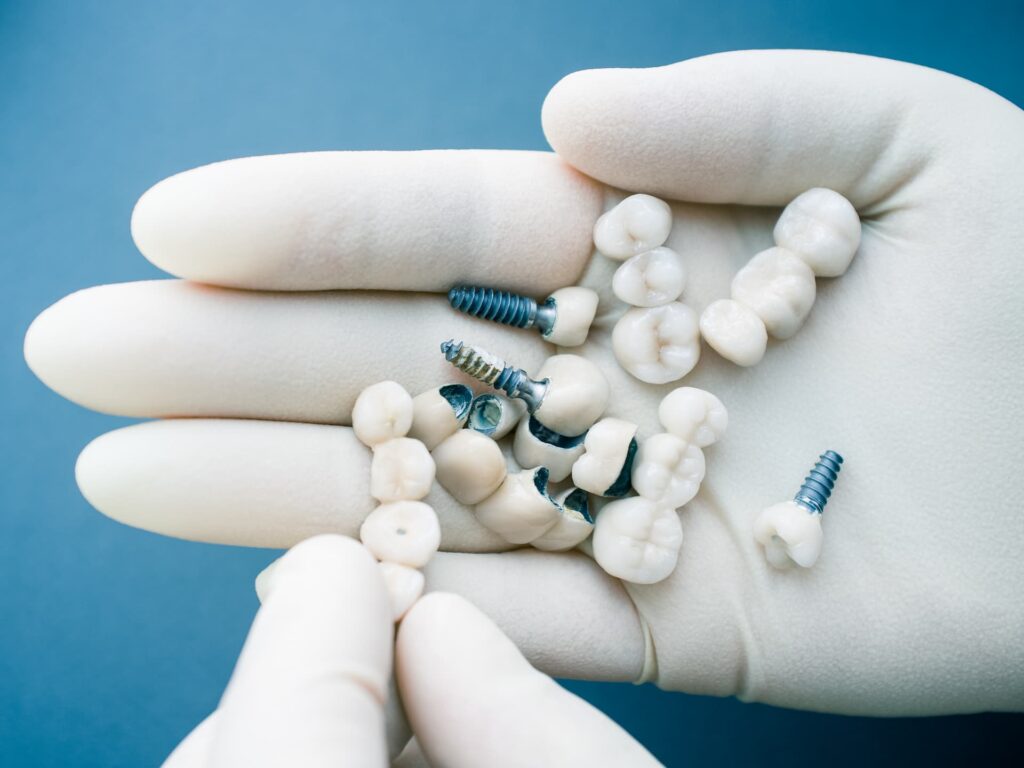A dental implant is a surgical procedure used to replace missing teeth. A crown is used to cover a damaged or decayed tooth and can also be used in combination with a dental implant to hold the implant in place.
Comparing dental implants vs. crowns is important because it helps patients decide which treatment option is best suited for their needs. It is also important to compare the cost of the two treatments and the associated advantages and disadvantages.
A dental implant can be beneficial for anyone who has missing teeth or needs to replace a damaged tooth. A crown can be beneficial for patients who need to repair a damaged or decayed tooth.
In some cases, a crown may be recommended in combination with a dental implant to hold the implant in place.
What is a Dental Implant?
A dental implant is an artificial tooth root that is placed into your jaw to hold a replacement tooth or bridge in place. The implant is made of titanium and other materials that are compatible with the human body.
How does a dental implant work?
The implant is placed into the jawbone and allowed to fuse with the bone over a period of time. Once the implant has fused with the jawbone, a crown, bridge, or denture can be attached to the implant to replace missing teeth.
The procedure for getting a dental implant involves multiple steps, including:
- planning the implant placement
- preparing the jawbone
- placing the implant
- attaching the abutment, and finally
- attaching the crown or bridge
Pros and cons of getting a dental implant
- The pros of getting a dental implant include improved appearance and a more natural feeling in the mouth.
- The cons of getting a dental implant include a higher cost and a longer healing process than with other dental procedures, such as crowns.
What is a Crown?

A dental crown is a cap that is placed over an existing natural tooth to restore its size, shape, and strength. It is usually made from porcelain, ceramic, or metal materials.
A crown is placed over a tooth to restore its structure and function. It is usually placed over a damaged or weakened tooth to improve its stability. The crown covers the entire visible portion of the tooth, providing protection and strength to the tooth.
The procedure for getting a crown usually involves a few steps
- First, the dentist will take X-rays and impressions of the tooth to determine the size and shape of the crown.
- Then the dentist will prepare the tooth by removing any decay or debris.
- The crown will then be fitted and bonded to the tooth.
Pros and cons of getting a crown
- Pros: A crown can improve a tooth’s look, shape, and strength. It can also provide protection to a damaged or weakened tooth.
- Cons: Crowns may require additional care and maintenance. They can also be expensive and require multiple visits to the dentist to be fitted correctly.
Dental Implant vs. Crown: Which is Better?
Making the decision between a dental implant and a crown can be difficult. Both treatments offer a range of advantages and drawbacks, and it’s important to weigh up your options carefully.
At Hanna Dental, we are dedicated to providing our patients with the best possible treatment option for their individual needs.

Comparison of Dental Implant vs. Crown at a Glance
| Dental Implant | Crown | |
| Treatment Time | 3-6 months | 2-3 visits |
| Procedure Complexity | Complex | Simple |
| Invasive | Yes | Yes |
| Success Rate | High (95%) | High (85-95%) |
| Maintenance | Regular check-ups and cleanings | Regular check-ups and cleanings, possible replacement after 10-15 years |
| Cost | Expensive | Less expensive |
| Durability | Long-lasting | Not as long-lasting |
| Appearance | Natural-looking | Natural-looking |
| Suitability | Missing teeth, jawbone is healthy | Damaged or decayed tooth, jawbone is healthy |
| Adjacent Teeth | No impact | May require shaving down adjacent teeth |
| Usually Recommended For | Single or multiple missing teeth, healthy jawbone and gums | Damaged or decayed tooth that cannot be restored with a filling or crown, healthy jawbone and gums |
Factors to consider when choosing between dental implant and crown
Before deciding which treatment is best for you, it’s important to consider a few factors:
- the location of the tooth
- the amount of available bone
- your overall health and budget
- the time needed for the treatment to be completed
Comparison of the benefits of dental implants and crowns
A dental implant is a more permanent solution, as it is surgically inserted into your jawbone and acts as an artificial tooth root. This allows the implant to be a more secure and longer-lasting solution than a crown.
On the other hand, a crown is a more affordable and quicker option, as it can be fitted over an existing tooth. It can also be used to protect a damaged or weak tooth, as well as to improve the appearance of a tooth.
Comparison of the drawbacks of dental implants and crowns
The main drawback of a dental implant is that it is a more expensive and invasive treatment. Additionally, it can take several months to complete, as it requires the implant to be integrated into the jawbone.
In comparison, a crown is a much quicker and less expensive option, but it is not as secure as an implant and may need to be replaced over time.

Cost of Dental Implants vs. Crowns
The cost of a dental implant vs. a dental crown can vary significantly depending on the material used and the complexity of the procedure.
A dental implant is typically more expensive than a dental crown, as it involves a more complex process that requires additional materials, such as a titanium implant post, abutment, and a dental crown.
The cost of a dental crown is generally lower than that of a dental implant, as it only requires one material (porcelain or metal) and is less labor-intensive.
How does insurance affect the cost?
The cost of a dental implant vs. a dental crown can be affected by insurance coverage, as some insurers may cover part of the cost of the implant while others may not. It is important to check with your insurance provider to see what coverage is available.
Comparison of the cost of dental implant and crown
On average, a dental implant will cost more than a crown, with the cost of a dental implant ranging from $2,000 to $4,000, while the cost of a crown typically ranges from $500 to $2,000.
However, the cost of a dental implant may be reduced depending on insurance coverage, whereas the cost of a dental crown is not typically affected by insurance.
Longevity of a Dental Implant vs. a Crown
Comparing the longevity of dental implants and crowns is important when making a decision about which one is right for you.
Longevity of a dental implant vs. a crown
A dental implant typically lasts a lifetime, while a crown may last anywhere from five to fifteen years, depending on the type of material used and your oral hygiene habits.
Factors that affect the lifespan
Factors that affect the lifespan of a dental implant or crown include the material used, the location of the implant or crown, your oral hygiene habits, and whether the implant or crown has been properly maintained.
Longevity of a dental implant vs. a crown
When considering the longevity of dental implants and crowns, it is important to consider the factors that affect their lifespan.
Dental implants are typically more durable and longer lasting than crowns, providing a lifetime of protection and beauty.
However, crowns are a suitable option for those who may not be eligible for a dental implant, and the right choice for you will depend on your individual needs and circumstances.

Dental Implant vs. Crown: Which Treatment is Suitable for You?
When it comes to dental implants vs. crowns, the choice can be difficult to make. You must take into consideration the extent of the damage, your budget, and the desired results. Your dentist will be able to help you decide which treatment is most suitable for you.
Factors to consider when deciding between a dental implant and a crown
When considering dental implants vs. crowns, it is important to look at the cost, the extent of the damage, the time involved, and the desired results.
Dental implants are a more expensive option, but they last longer and do not require as much maintenance.
Crowns are less expensive but may need to be replaced more often. Both treatments also involve some degree of discomfort and recovery time.
How to determine which treatment is suitable for you
Your dentist will be able to help you make the best decision for your individual needs. They will discuss with you the extent of the damage, your budget, and the desired results.
They will also provide advice on which treatment is best for you. They may even suggest a combination of treatments, such as a crown and a dental implant.
Tips on how to choose the right dentist
Choosing the right dentist is essential to get the best results from your dental implants or crowns. You should look for a dentist who has experience in the treatment you are looking for, as well as one who is willing to answer any questions you may have. You should also research reviews and ask for referrals from other patients.
FAQs About Dental Implant vs Crown
Is it better to get a crown or implant?
When considering a dental restoration, both dental implants and crowns serve as viable options depending on the situation. Implants are suitable for replacing a single missing tooth, while crowns are better suited to restoring multiple teeth or large areas of damage.
Do implants last longer than crowns?
When it comes to longevity, dental implants typically last longer than crowns. With proper care and maintenance, a dental implant can last for many years without the need for replacement, while crowns may need to be replaced every 10 to 15 years.
Are dental implants stronger than crowns?
Dental implants are inherently stronger than crowns. Unlike crowns, dental implants are directly fused to the jawbone, providing additional strength and stability.
Should I get a crown or implant for a broken tooth?
The best option for a broken tooth depends on the extent of the damage. If the damage is limited, a crown may be the most suitable option, as it can restore the function of the tooth. If the tooth is severely damaged, a dental implant is the best option as it replaces the entire tooth.
Conclusion
A dental implant is a titanium post that is placed in your jawbone and acts as a permanent replacement for a missing tooth. A dental crown, on the other hand, is a cap that is placed on top of a weakened or damaged tooth to protect it and restore its shape, size, and function.
When it comes to dental implants vs. crowns, the choice depends on your individual needs and the recommendation of your dentist. Dental implants are a permanent solution and typically require fewer follow-up visits, while a crown can be a good option if your tooth does not require any additional support. It is important to discuss the pros and cons of each option with your dentist and make an informed decision based on the advice of a qualified professional.
At Hanna Dental, we are dedicated to providing the highest quality of care and a wide range of dental services. Our experienced team of dentists can help you make the right decision in terms of dental implant vs. crown and provide you with the best treatment possible.



